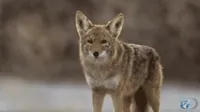By ecoRI News staff
 Rhode Island has been awarded a $1.1
million grant for a five-year study of coyotes to be conducted by the Rhode
Island Natural History Survey and The Conservation Agency.
Rhode Island has been awarded a $1.1
million grant for a five-year study of coyotes to be conducted by the Rhode
Island Natural History Survey and The Conservation Agency. The research will look at the changing coyote population, how coyotes interact with people, and the best ways for people and coyotes to co-exist safely in the state’s increasingly urbanized landscape.
The research will be led by Numi
Mitchell, of The Conservation Agency’s Narragansett Bay Coyote Study,
and involve partnerships with the University of Rhode Island, Rhode Island
Department of Environmental Management (DEM), Roger Williams Park Zoo and CoyoteSmarts.org.
Community involvement also will be an important component of the study.
Funding for the project is provided
by DEM’s Division of Fish & Wildlife through the U.S. Fish & Wildlife
Service’s Wildlife and Sport Fish Restoration Program.
So far Mitchell’s research has
found that coyote problems and safety concerns in neighborhoods are often
associated with food being provided to coyotes by people. The feeding or
baiting of wildlife is prohibited in Rhode Island.
The project team will be asking for
the public’s help to find coyote “hot spots” — areas where lots of coyotes
visit often to get food, raise pups, or mark territory.
Using GPS tracking collars, trail cameras, and traditional tracking techniques, researchers will observe coyote territoriality and pack composition before and after cleaning up any significant human-provided food resources in the area.
Researchers will track two coyotes in each hot spot for up to a year.
Using GPS tracking collars, trail cameras, and traditional tracking techniques, researchers will observe coyote territoriality and pack composition before and after cleaning up any significant human-provided food resources in the area.
Researchers will track two coyotes in each hot spot for up to a year.
If residents know a place where
there is a lot of coyote activity, they can share that information with the
project using an interactive online map.
Residents, as well as municipal and
state officials, will also be enlisted to help report and clean up food
subsidies around each study site so researchers can look for changes in coyote
behavior and population density.
As part of the study, T.J. McGreevy,
research assistant professor of natural resources science at URI, will carry
out genetic analysis of the coyote population. Volunteers will collect coyote
scat at hot spots for DNA fingerprinting.
This will help identify the number of coyotes in a pack and the genetic relationships among packs across the state. Scat analysis will also help researchers learn about coyote diet from place to place and at different seasons.
This will help identify the number of coyotes in a pack and the genetic relationships among packs across the state. Scat analysis will also help researchers learn about coyote diet from place to place and at different seasons.
Roger Williams Park Zoo will also be
participating in the project.
“Our goal at the zoo is to provide a
clear understanding to the public on the relationship between urban wildlife
and the human population,” said Lou Perrotti, the zoo’s director of
conservation programs.
“We want adults and children to understand the personality of the coyote so they can learn to respect and understand this animal, and realize that coyotes are not pests but in fact play a valuable ecological role. We hope that the information we provide will give folks the tools to observe and not engage with any coyote they see in their neighborhoods or parks.”
“We want adults and children to understand the personality of the coyote so they can learn to respect and understand this animal, and realize that coyotes are not pests but in fact play a valuable ecological role. We hope that the information we provide will give folks the tools to observe and not engage with any coyote they see in their neighborhoods or parks.”
Mitchell has been studying coyotes
on Aquidneck Island and in Jamestown for more than 14 years.
Her research so far suggests that coyotes and humans can co-exist safely in even densely developed neighborhoods as long as coyotes don’t come to associate humans with food. Coyotes can be a safety problem when people feed them, whether deliberately or unintentionally.
Her research so far suggests that coyotes and humans can co-exist safely in even densely developed neighborhoods as long as coyotes don’t come to associate humans with food. Coyotes can be a safety problem when people feed them, whether deliberately or unintentionally.
This grant allows Mitchell to expand
her research, conducting the first controlled food-removal experiments across
Rhode Island. She will also test her theory on the mainland in different
habitats than occur on the islands and where coyote movements aren't restricted
by shorelines on all sides.
This research, along with other information collected by state agency biologists, allows DEM to make informed management decisions regarding coyotes.
This research, along with other information collected by state agency biologists, allows DEM to make informed management decisions regarding coyotes.
The total project cost, including
private matching funds, is $1.5 million over five years. Matching funds are
provided by the project partners and by the Prince Charitable Trusts and the
Rhode Island Foundation.
“The Natural History Survey was
created to facilitate projects like this, with diverse partners, complex
funding, and an application of science to real-world problems,” executive
director David Gregg said.
“The insights we’ll gain and the connections we’ll make in the course of this research will materially improve our understanding of the world around us.”
“The insights we’ll gain and the connections we’ll make in the course of this research will materially improve our understanding of the world around us.”